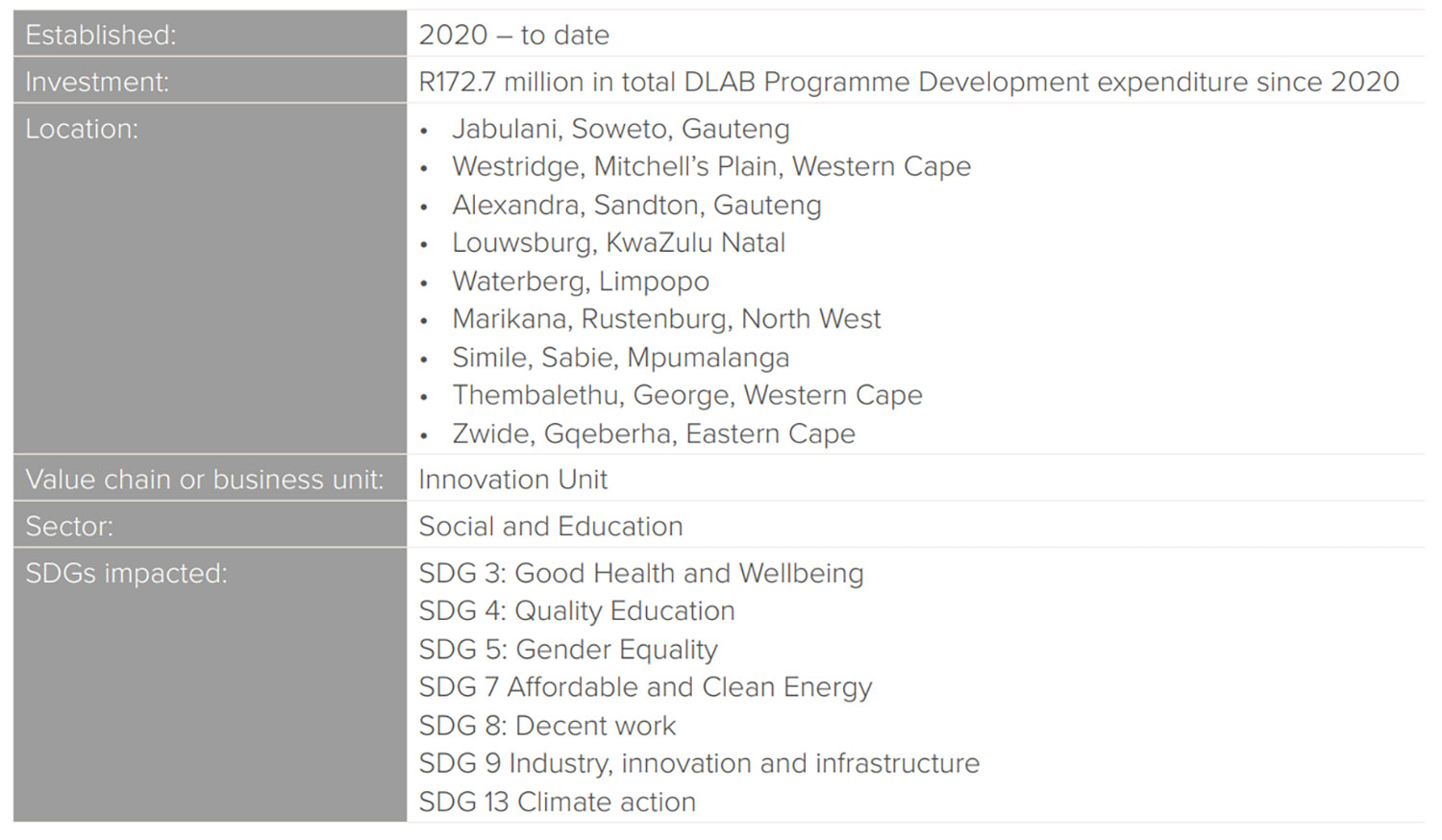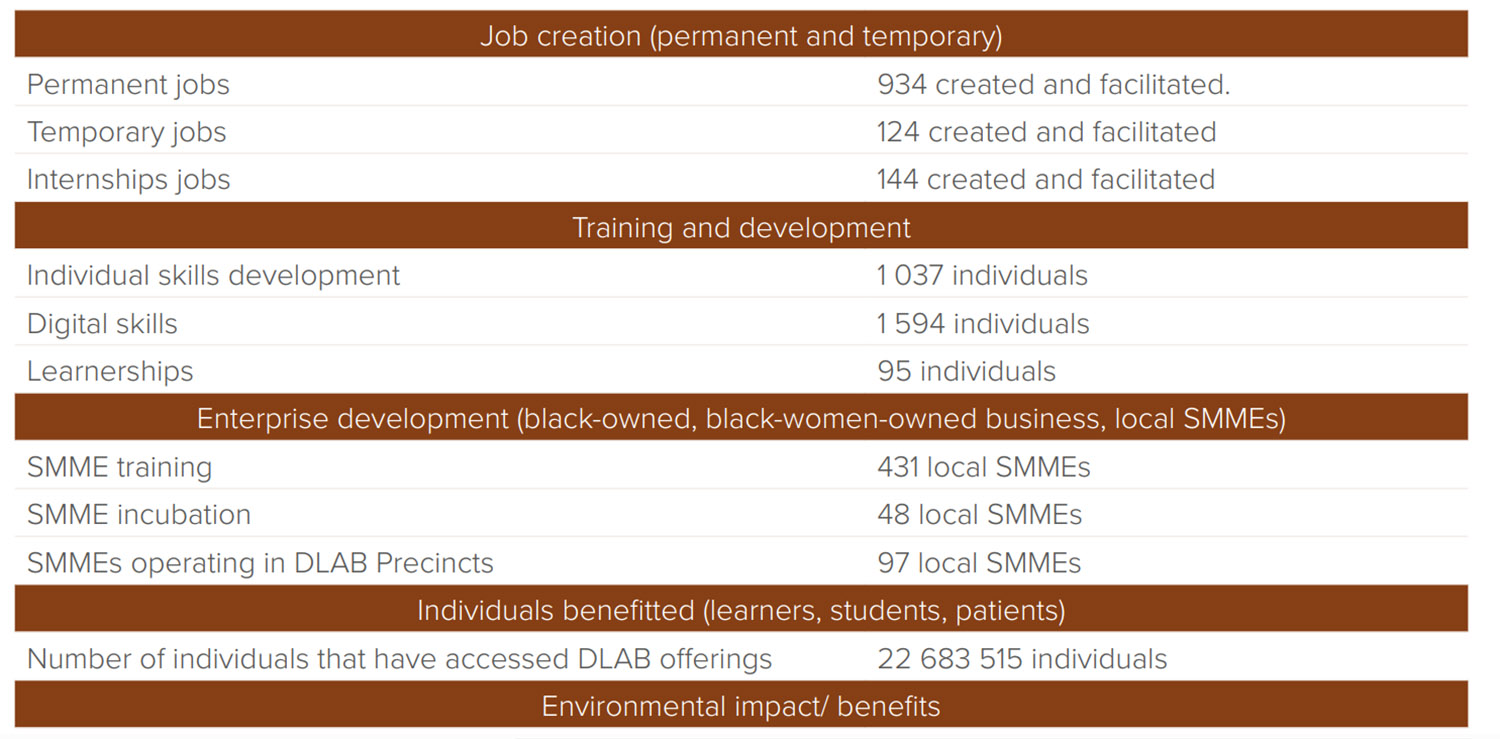The DLAB Programme - Innovative and Sustainable Development
Leveraging the DBSA’s convening power, the programme has established a network of approximately 30 key stakeholder partnerships spanning civil society, business, government and other like-minded groups with shared developmental goals.

The DLAB Programme is a South African initiative providing meaningful access to opportunities and fostering economic activities for youth by promoting inclusive, community-based economic development and large-scale sustainable growth. Its goal is to unlock human creativity and innovation potential and invest in impactful partnerships. Leveraging the DBSA’s convening power, the programme has established a network of approximately 30 key stakeholder partnerships spanning civil society, business, government and other like-minded groups with shared developmental goals. This partnership platform creates financial and non-financial opportunities within the DLAB Precinct ecosystem, mobilises and attracts investments through targeted investing, yields developmental returns and stimulates the township economy.
Innovation has been at the core of the DLAB Programme since its inception. Adopting a “fail fast, learn faster” approach, the programme has evolved through various learnings from implementation. This financial year, 2023/24, focused on consolidating these insights to ensure the programme’s long-term sustainability. This financial year is designated as a consolidation year, with specific programme-related activities performed alongside ongoing implementation.
In 2020, the DLAB Programme was initiated with pilot sites in Jabulani (Soweto) and Westridge (Mitchell’s Plain), founded on a vision of inclusive development, community empowerment and self-sustainability. Four years later, five operational DLAB sites have developed into thriving, holistic ecosystems. These sites deliver transformative results by uniting local partners and services to accelerate progress in education, health, recreation, employability and entrepreneurship.
In 2024 implementation continued, with additional specific programme-related activities, including:
- Undertaking an independent review of the DLAB ‘s current state and the programme’s value proposition to assess the readiness for the DLAB programme to be institutionalised and scaled
- Compiled a case outlining the requirements for scaling and institutionalising of the DLAB Programme
- Commissioned a DLAB's Social Return on Investment Framework to quantify [in monetary terms] the social impact being achieved
Outputs
The DLAB Programme successfully achieved the targets set by partners in our 2024 implementation plan. The DLAB Programme continues to be a space that provides the youth with opportunities. The team saw more than 22 683 515 participants register for various programmes available at the DLAB. The SCALP programme continues to be popular and the key attraction for the youth. 5 693 youth are currently participating in SCALP programmes. Community outreach and mobilisation remain key to accessing participants that have not had the chance to come into the facility and the elderly. The health and ZLTO programmes have been instrumental in community outreach, the Wits Health Hubb advocates provided basic wellness checks to 64 153 community members. The ZLTO offering saw 45 058 social impact transactions being completed through by DLAB-engaged participants. As in many disadvantaged communities, unemployment is high. However, the Youth Cafe continues to be the link between the youth and opportunities for work. Youth cafe has facilitated the placement of 239 youth into learnership opportunities and into internships.
All DLAB Development Results are audited internally by DBSA screening and review team and by the Auditor[1]General of South Africa, an external national authority. In addition to the quantitative outcomes captured in the DRTs, numerous qualitative impacts have been observed throughout the year, including an improvement in participants’ overall well-being. A sample of these positive qualitative results are illustrated in the personal testimonies shared in this report.
Outcomes
Inclusive local economic development
Financial sustainability has been a crucial measure of success for the programme. Since its inception, partners have been dedicated to achieving the goals outlined in DLAB’s 5-year sustainability strategy. The ground breaking Jabulani Business Process Outsourcing project, launched in 2022, marks a significant milestone in this strategy. Phase 2 construction has recently been completed, and agents were set to begin operations in April 2024. Collaborating with operating partner Merchants, the programme is also establishing an additional contact centre to serve DoorDash, an online food ordering and delivery platform based in San Francisco. This initiative presents a unique opportunity as it marks the first time this US corporation has outsourced services to South Africa. This expansion not only creates new employment opportunities but also contributes to the overall growth and diversification of our business landscape, enhancing the financial sustainability of the DLAB.
Partners in the Alexandra DLAB precinct are making significant progress towards completing the construction of a cutting-edge Business Process Outsourcing facility by the end of March. This ambitious endeavour draws from the insights and successes of our pilot project in Jabulani, signifying a substantial expansion of this innovative model for economic empowerment. Notably, the Alexandra Business Process Outsourcing will mark a significant milestone as the first contact centre in South Africa to serve an international financial services client, Capital One. This achievement holds immense importance, not only for DLAB partners but also for the future of township based economies across South Africa. By securing one of the two contracted contact centres to be established in Alexandra, alongside another in neighbouring Sandton, we are signalling the untapped potential of township economies and local talent.
These achievements are a testament to the power of our partnership and our ability to deliver on a truly transformative vision for township economies.
Lessons Learned
These valuable lessons have proved useful in the ongoing development of existing sites, as well as in the establishment and operationalisation of new precinct sites. Three key insights to date include:
Community buy-in is indispensable
Partners must identify and carefully engage with local community members and stakeholders, as a rushed community engagement process bears high risks of creating grievances that can complicate the set-up and operationalisation of a DLAB precinct.
Tailored responses to site-specific needs are essential
While certain socio-economic challenges resemble one another across different communities, the most effective solutions are tailored to site-specific needs. A thorough process to identify these needs is critical. Thereafter, the DLAB collective must articulate and pursue a common agenda.
Securing land access and usage rights requires time and careful engagement
Obtaining land tenure rights and development rights is a delicate process that requires careful engagement with a municipality and local stakeholders.

Soweto, Mitchell's Plain, Alexandra, Louwsburg, Waterberg, Marikana, Sabie, George, Gqeberha
934
124
144
1037
R172.7 Million




